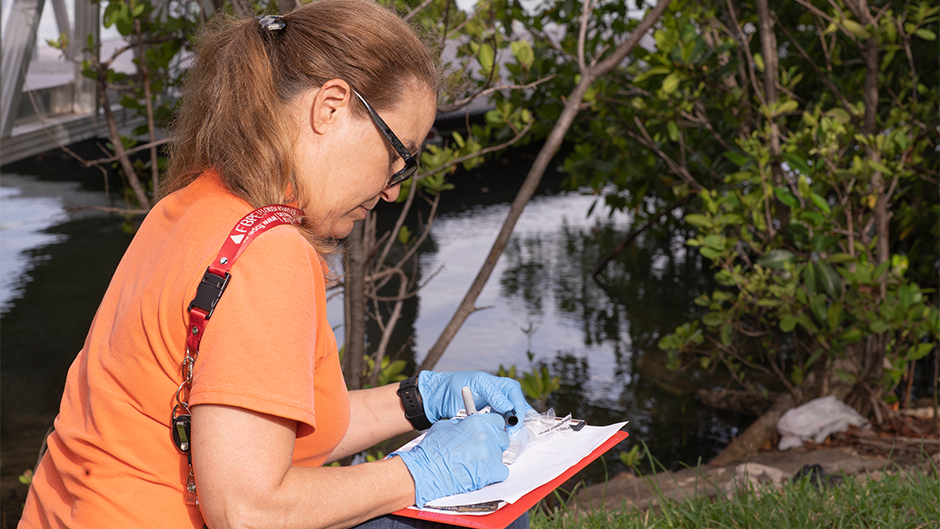A leader in the growing field of environment engineering, Helena Solo-Gabriele is passionate about understanding how water-borne contaminants affect human health. “I love hydrology, and my research focuses on the causes and movements of disease-carrying microbes and other dangerous substances,” said Solo-Gabriele, Ph.D., P.E., professor in the Department of Chemical, Environmental, and Materials Engineering, and associate dean for research in the College of Engineering.
For more than a decade, Solo-Gabriele has teamed with epidemiologists, public health professionals and South Florida communities to address challenging environmental problems. Her laboratory and field studies have also created valuable learning opportunities for engineering students at all stages of their studies.
A family of ’Canes
A proud University of Miami alumnae, Solo-Gabriele, BS ’87, MS ’88, grew up in a family of ’Canes. Her father as a mechanical engineer, and her sister earned a degree in industrial generation. Now her daughter majoring in architectural engineering.
“Microbiology was my favorite subject in high school,” said Solo-Gabriele. “But my mom – who moved here from Cuba when she was 18 and became a teacher – suggested I major in engineering to be sure of having a job after earning my college degree.”
Although Solo-Gabriele changed her major to civil engineering, she continued to take classes in chemistry and biology as well. “When I took a class in water treatment design, I knew I wanted to build a career in environmental engineering,” she said.
Numerous high-impact studies
Solo-Gabriele joined the College of Engineering faculty after earning her doctorate in civil and environmental engineering from Massachusetts Institute of Technology. Since then, her research has included a variety of high-impact environmental studies involving the health of children and adults.
After the 2010 Deepwater Horizon oil spill, Solo-Gabriele was named principal investigator for a study on the long-term health risks to children, “Beach Exposure And Child HEalth Study (BEACHES)” – a component of the UM’s leading role in the decade-long Gulf of Mexico Research Initiative (GoMRI). That study drew on field samples and historic data to validate algorithms regarding children’s exposure to contaminants in beach zones where they play.
In September 2020 during the COVID pandemic, Solo-Gabriele launched a University of Miami study that detected the virus and its variants in campus wastewater. “A lot of expertise was needed for collecting representative samples using personal protective equipment (PPEs) and analyzing them for meaningful results,” she said. Last year, the COVID detection project expanded to include the Virginia Key wastewater plant, which serves more than 800,000 people in Miami-Dade County, as well as Miami-Dade County Public Schools.
Current projects
This year, Solo-Gabriele was asked by the City of Miami Beach to look into sources of fecal bacteria in the canal around Parkview Island. Her team that launched an intensive water sampling project in August and recently submitted a draft report to the city.
Farther afield, Solo-Gabriele is co-leading the Children's Soil & Dust Ingestion Study at the North Carolina Agricultural and Technical State University funded by the U.S. Environmental Protection Agency (EPA). “My role is measuring the mass of dust on household surfaces and children’s hands,” she said. “This will help us understand the level of airborne contaminants in their homes.”
Finally, Solo-Gabriele is also studying levels of PFAS, a “forever” chemical associated with health problems, in landfill reservoirs. “This is a high priority project for the EPA, and our UM team is looking forward to finishing our study next summer.”

